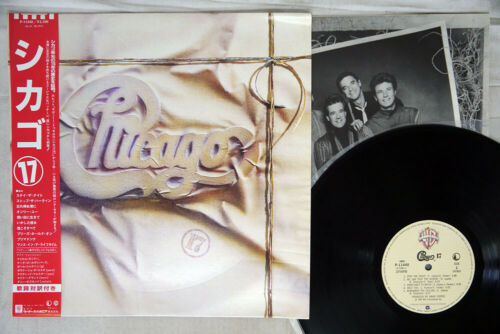Chicago Vinyl Records Lps For Sale
Check out these new and used Chicago vinyl records LPs for sale. We recommend starting your Chicago vinyl collection with the essential albums Chicago Transit Authority, Chicago II and Chicago III. Our inventory is always changing, so check back often, or browse our list of vinyl records for sale from rock musicians.
Greatest Hits 1982-1989
8% OffChicago II (Steven Wilson Remix)
Chicago IX: Greatest Hits Expanded
$34.98 (as of July 5, 2025 23:58 GMT +00:00 - More infoProduct prices and availability are accurate as of the date/time indicated and are subject to change. Any price and availability information displayed on [relevant Amazon Site(s), as applicable] at the time of purchase will apply to the purchase of this product.)Chicago V (Gold Anniversary Vinyl/Limited Edition/Gatefold Cover)
7% OffChicago At The John F. Kennedy Center For The Performing Arts, Washington D.C. (9/16/1971)
37% OffCHICAGO VI (METALLIC SILVER VINYL/LIMITED EDITION/GATEFOLD COVER)
Chicago--Music from the Miramax Motion Picture Picture [2LP] (RED WITH YELLOW STREAKS "CHICAGO FIRE" VINYL)
CHICAGO X (CLEAR GOLD VINYL/LIMITED EDITION/GATEFOLD COVER)
$37.98 (as of July 5, 2025 23:58 GMT +00:00 - More infoProduct prices and availability are accurate as of the date/time indicated and are subject to change. Any price and availability information displayed on [relevant Amazon Site(s), as applicable] at the time of purchase will apply to the purchase of this product.)Chicago
$18.88 (as of July 6, 2025 10:09 GMT +00:00 - More infoProduct prices and availability are accurate as of the date/time indicated and are subject to change. Any price and availability information displayed on [relevant Amazon Site(s), as applicable] at the time of purchase will apply to the purchase of this product.)Chicago III
$7.98 (as of July 6, 2025 10:09 GMT +00:00 - More infoProduct prices and availability are accurate as of the date/time indicated and are subject to change. Any price and availability information displayed on [relevant Amazon Site(s), as applicable] at the time of purchase will apply to the purchase of this product.)
Chicago: The Windy City’s Musical Legacy
The Formation of a Rock Powerhouse
Genesis of Chicago (1967-1969)
Chicago, originally known as the Chicago Transit Authority, emerged during the vibrant musical landscape of the late 1960s. Formed in 1967, the band initially comprised Walter Parazaider, Terry Kath, Danny Seraphine, Lee Loughnane, James Pankow, Robert Lamm, and Peter Cetera. Their self-titled debut album, “Chicago Transit Authority” (1969), laid the foundation for a musical journey that would span decades.
Debut Album: Chicago Transit Authority (1969)
The debut album was a double-disc collection of eclectic tracks that showcased the band’s versatility. From the horn-driven energy of “Introduction” to the progressive complexities of “Liberation,” the album announced Chicago’s arrival as a formidable force in the world of rock.
Chicago II (1970)
Symphonic Ambitions
“Chicago II,” released in 1970, continued the band’s exploration of diverse musical styles. With its symphonic ambitions and progressive rock elements, the album marked a pivotal moment in Chicago’s discography.
“25 or 6 to 4” and Jazz-Rock Fusion
“25 or 6 to 4,” a standout track, exemplified Chicago’s ability to fuse jazz-rock elements with catchy hooks. The song’s distinctive guitar riff, Kath’s powerful vocals, and the dynamic horn arrangements showcased the band’s evolving sound.
Chicago III (1971)
Artistic Experimentation
“Chicago III,” released in 1971, reflected the band’s ongoing commitment to artistic experimentation. The triple-disc album featured an eclectic mix of genres, from jazz to rock to experimental interludes.
“Free” and Experimental Phases
“Free,” a track from the album, ventured into experimental territory with its avant-garde structure and free-form improvisations. The song highlighted Chicago’s willingness to push the boundaries of conventional rock and embrace a more progressive approach.
Chicago V (1972)
Commercial Success and Chart Dominance
“Chicago V,” released in 1972, marked a period of commercial success and chart dominance for the band. The album produced hits like “Saturday in the Park” and “Dialogue (Part I & II),” elevating Chicago to mainstream acclaim.
“Saturday in the Park” and Celebration of Life
“Saturday in the Park” became a quintessential Chicago track, celebrating the vibrancy of life with its catchy melody and Lamm’s evocative lyrics. The album’s success solidified Chicago’s standing as a chart-topping rock powerhouse.
Chicago VI (1973)
Transition and Acoustic Explorations
“Chicago VI,” released in 1973, showcased a transitional phase for the band. The album featured a mix of electric and acoustic tracks, reflecting Chicago’s evolving musical identity.
“Just You ‘n’ Me” and Romantic Balladry
“Just You ‘n’ Me,” a romantic ballad from the album, demonstrated Chicago’s ability to craft timeless love songs. Cetera’s soulful vocals and the seamless integration of horns highlighted the band’s proficiency in creating emotionally resonant music.
Chicago VII (1974)
Jazz Fusion Odyssey
“Chicago VII,” released in 1974, ventured into jazz fusion territory with a double-disc exploration of intricate compositions and diverse musical influences.
“Call on Me” and Jazz-Rock Fusion
“Call on Me,” a jazz-rock fusion track, showcased Chicago’s instrumental prowess and intricate arrangements. The album’s expansive soundscapes demonstrated the band’s commitment to pushing the boundaries of their sonic palette.
Chicago VIII (1975)
Return to Rock Roots
“Chicago VIII,” released in 1975, marked a return to the band’s rock roots after the experimental excursions of previous albums. The album featured a balance of accessible rock tracks and more introspective compositions.
“Old Days” and Nostalgic Reflection
“Old Days,” a track from the album, reflected a nostalgic tone with its lyrics celebrating the memories of the past. The song’s anthemic quality resonated with audiences, adding another dimension to Chicago’s diverse catalog.
Chicago IX: Chicago’s Greatest Hits (1975)
Compilation Triumph
“Chicago IX: Chicago’s Greatest Hits,” released in 1975, compiled the band’s most successful tracks up to that point. The album served as a testament to Chicago’s chart dominance and showcased the band’s ability to craft enduring hits.
“Wishing You Were Here” and Compilation Success
“Wishing You Were Here,” a previously unreleased track on the compilation, became a radio hit. The album’s success reinforced Chicago’s status as a commercial powerhouse in the music industry.
Chicago X (1976)
Exploration of Disco and Ballads
“Chicago X,” released in 1976, saw the band exploring disco influences alongside their signature ballads. The album featured hits like “If You Leave Me Now,” a ballad that became one of Chicago’s most iconic songs.
“If You Leave Me Now” and Grammy Triumph
“If You Leave Me Now” earned Chicago their first Grammy Award, and the song’s soft rock appeal marked a departure from the more complex arrangements of earlier works. The album’s success showcased the band’s adaptability to evolving musical trends.
Chicago XI (1977)
Continued Chart Success
“Chicago XI,” released in 1977, continued Chicago’s chart success with a mix of rock, pop, and jazz-infused tracks. The album included contributions from guitarist Don Felder of the Eagles.
“Baby, What a Big Surprise” and Pop Sensibility
“Baby, What a Big Surprise” became a chart-topping single, showcasing Chicago’s ability to blend pop sensibility with their rock foundation. The song’s catchy melody and romantic theme resonated with a broad audience.
Chicago XII (1978)
Continued Evolution
“Chicago XII,” released in 1978, continued the band’s evolution with a focus on radio-friendly tracks. The album featured a cover of the Beach Boys’ “Wishing You Were Here,” reflecting Chicago’s appreciation for the classics.
“Alive Again” and Radio-Friendly Rock
“Alive Again,” a track from the album, embraced a radio-friendly rock sound with its upbeat tempo and infectious hooks. The song exemplified Chicago’s adaptability to changing musical landscapes.
Chicago 13 (1979)
Disco Influences and Lineup Changes
“Chicago 13,” released in 1979, embraced disco influences and marked the departure of founding member Terry Kath. Despite the challenges, the album featured a mix of genres, from disco to soft rock.
“Street Player” and Disco Fusion
“Street Player,” a disco-infused track, demonstrated Chicago’s willingness to experiment with new sounds. The album reflected a period of transition for the band as they navigated the changing musical landscape of the late 1970s.
Chicago XIV (1980)
Transition and New Directions
“Chicago XIV,” released in 1980, marked a period of transition with the addition of new members and a shift toward a more mainstream sound.
“Hard to Say I’m Sorry” and Chart Resurgence
“Hard to Say I’m Sorry,” a power ballad from the album, became a major chart success. The song’s emotional resonance and radio-friendly appeal marked a resurgence for Chicago, reaffirming their ability to connect with audiences across generations.
Chicago 16 (1982)
Synth-Pop Influences and Commercial Peak
“Chicago 16,” released in 1982, saw the band embracing synth-pop influences and marked a commercial peak for Chicago in the 1980s.
“Hard Habit to Break” and Synth-Pop Mastery
“Hard Habit to Break,” a synth-pop ballad, showcased Chicago’s mastery of the genre. The song’s lush production, Cetera’s emotive vocals, and the band’s polished sound contributed to its success on the charts.
Chicago 17 (1984)
Continued Pop Success
“Chicago 17,” released in 1984, continued Chicago’s pop success with a string of hits that solidified their status as chart-topping veterans.
“You’re the Inspiration” and Romantic Balladry
“You’re the Inspiration,” a romantic ballad featuring Peter Cetera’s distinctive vocals, became a classic love song. The album’s commercial success reinforced Chicago’s enduring appeal in the mainstream music landscape.
Chicago 18 (1986)
Transition and New Vocalists
“Chicago 18,” released in 1986, marked a transition with new vocalists replacing Peter Cetera. Despite the lineup changes, the album continued Chicago’s tradition of crafting radio-friendly hits.
“Will You Still Love Me?” and Power Balladry
“Will You Still Love Me?” became a power ballad that showcased the band’s ability to create emotionally resonant music even amid personnel changes. The song’s success on the charts demonstrated Chicago’s resilience.
Chicago 19 (1988)
Late ’80s Pop-Rock
“Chicago 19,” released in 1988, continued the band’s exploration of pop-rock sounds. The album featured contributions from Jason Scheff, who had taken over as lead vocalist.
“Look Away” and Chart-Topping Success
“Look Away,” a ballad from the album, achieved chart-topping success. The song’s commercial appeal and emotional depth marked a continuation of Chicago’s ability to evolve with the times.
Chicago 21 (1991)
Adaptation to Changing Sounds
“Chicago 21,” released in 1991, showcased the band’s adaptation to changing musical sounds while staying true to their signature style. The album featured a mix of ballads and rock-infused tracks.
“Chasin’ the Wind” and Bluesy Rock
“Chasin’ the Wind,” a bluesy rock track, demonstrated Chicago’s ability to incorporate diverse elements into their music. The song’s dynamic arrangement and horn-driven sections added a blues-infused edge to the band’s sound.
Chicago 22 (1995)
Continued Evolution and Legacy
“Chicago 22,” released in 1995, marked a continued evolution for the band as they navigated the shifting currents of the music industry.
“Here in My Heart” and Timeless Sound
“Here in My Heart,” a track from the album, maintained Chicago’s timeless sound. The song’s melodic richness and orchestral arrangements paid homage to the band’s enduring legacy.
Chicago 25: The Christmas Album (1998)
Festive Celebrations
“Chicago 25: The Christmas Album,” released in 1998, showcased Chicago’s festive side with a collection of holiday classics and original compositions.
“Let It Snow! Let It Snow! Let It Snow!” and Yuletide Cheer
“Let It Snow! Let It Snow! Let It Snow!” became a holiday favorite, capturing the Yuletide cheer with Chicago’s signature brass arrangements and soulful vocals.
Chicago XXX (2006)
Return to Roots
“Chicago XXX,” released in 2006, marked a return to the band’s roots with its focus on horn-driven rock and jazz-infused compositions.
“Feel” and Timeless Energy
“Feel,” a track from the album, embodied the timeless energy that has defined Chicago throughout their career. The song’s dynamic interplay between horns, guitars, and vocals showcased the enduring chemistry of the band.
Chicago XXXVI: Now (2014)
Contemporary Relevance
“Chicago XXXVI: Now,” released in 2014, demonstrated Chicago’s ability to remain relevant in contemporary music.
“Naked in the Garden of Allah” and Social Commentary
“Naked in the Garden of Allah,” a track from the album, delved into social commentary with its reflective lyrics. The song showcased Chicago’s continued engagement with meaningful themes and musical exploration.
Chicago at 50: Chicago II (2018)
Anniversary Celebration
“Chicago at 50: Chicago II,” released in 2018, celebrated the 50th anniversary of the band’s formation. The album featured a live performance of their iconic second album, “Chicago II.”
Timeless Classics Revisited
The live rendition of “Chicago II” reaffirmed the timeless appeal of the band’s classics, showcasing the enduring power of their music.
Legacy and Impact
Pioneers of Jazz-Rock Fusion
Chicago’s legacy as pioneers of jazz-rock fusion is firmly embedded in the annals of music history. Their innovative use of horns within a rock context set a precedent for future generations of musicians exploring genre boundaries.
Chart Dominance and Commercial Success
Chicago’s unparalleled chart dominance and commercial success underscore their ability to craft music that resonates with a broad audience. With numerous hit singles and albums, the band left an indelible mark on the Billboard charts throughout their career.
Enduring Catalog of Hits
Chicago’s enduring catalog of hits spans decades, encompassing a diverse array of musical styles. From rock anthems to soulful ballads, the band’s ability to consistently produce quality music has left an enduring impact on listeners worldwide.
Enduring Reverberations
Timeless Musicality
Chicago’s enduring reverberations in the music industry stem from their timeless musicality. The band’s ability to seamlessly blend rock, jazz, pop, and soul elements has ensured their relevance across generations.
Musical Adaptability
Chicago’s willingness to adapt to evolving musical landscapes while staying true to their core sound has contributed to their longevity. Their ability to incorporate new influences and experiment with different genres showcases a band that refuses to be confined by stylistic boundaries.
Communal Harmony
Chicago’s communal harmony, both in terms of musical collaboration and the seamless integration of diverse instruments, reflects a band that functions as a collective force. The interplay between vocals, guitars, keyboards, and horns has been a defining feature of their sound.
Chicago: The Legacy Continues
As Chicago continues to perform and record new music, their legacy endures as a testament to the power of innovation, musical diversity, and a commitment to creating timeless and resonant art. With a career that spans over five decades, Chicago’s journey through the realms of rock, jazz, pop, and beyond remains an inspiration for aspiring musicians.
CHICAGO-CHICAGO II-COLUMBIA KGP 24-REPRESS-1970-2xLP's-STEREO-POSTER-VG+ VINYL
 | $6.00 End Date: Sunday Jul-06-2025 18:41:57 EDT Buy It on eBay for only: $6.00 Buy It Now on eBay |
Chicago - Greatest Hits [New Vinyl LP] Colored Vinyl, Yellow
 | $21.85 Buy It on eBay for only: $21.85 Buy It Now on eBay |
Chicago - Greatest Hits 1982-1989 [New Vinyl LP]
 | $23.76 Buy It on eBay for only: $23.76 Buy It Now on eBay |
LOT of 10 45 RPM 1970'S Bread, P Brown, Cher, Carpenters, Chicago, Chi Coltrane
 | $14.99 Buy It on eBay for only: $14.99 Buy It Now on eBay |
CHICAGO-CHICAGO VI-COLUMBIA KC 32400-1st EDITION-1973-STEREO-LP-VG+ VINYL
 | $4.50 End Date: Sunday Jul-06-2025 18:42:19 EDT Buy It on eBay for only: $4.50 Buy It Now on eBay |
JIMMY ROGERS - WALKING BY MYSELF - CHESS 1643 - RARE 50'S CHICAGO BLUES 45 - VG-
 | $5.00 End Date: Sunday Jul-06-2025 18:05:01 EDT Buy It on eBay for only: $5.00 Buy It Now on eBay |
Chicago Double LP Vinyl Record Album KGP 24 1970 NO Poster VG+ R70
 | $15.00 Buy It on eBay for only: $15.00 Buy It Now on eBay |
CHICAGO V CBS/SONY SOPM21 Japan LP
 | $3.99 (1 bid) End Date: Sunday Jul-06-2025 20:00:00 EDT Bid |
Chicago – Does Anybody Really Know What Time It Is? 1970 Columbia Rock VG+
 | $3.00 Buy It on eBay for only: $3.00 Buy It Now on eBay |
CHICAGO LIVE IN JAPAN CBS/SONY SOPJ31XR Japan VINYL 2LP
 | $3.99 End Date: Sunday Jul-06-2025 21:07:00 EDT Buy It on eBay for only: $3.99 Buy It Now on eBay |
CHICAGO LOVE ME TOMORROW / BAD ADVICE FULL MOON P1715 Japan PROMO VINYL 7
 | $3.99 (1 bid) End Date: Sunday Jul-06-2025 21:35:00 EDT Bid |
CHICAGO II RTI HQ-180 180 gram Audiophile Double LP + POSTER 2009 RHINO R1 76172
 | $35.00 End Date: Sunday Jul-06-2025 20:48:56 EDT Buy It on eBay for only: $35.00 Buy It Now on eBay |
Chicago At Carnegie Hall Vol I II III IV 4 LP Set w/ Photo Book C4X 30865
 | $19.99 End Date: Sunday Jul-06-2025 20:07:44 EDT Buy It on eBay for only: $19.99 Buy It Now on eBay |
The Chicago Bears Shufflin' Crew Super Bowl Shuffle 1985 Album Vinyl LP Good
 | $16.80 Buy It on eBay for only: $16.80 Buy It Now on eBay |
Chicago – Chicago X - 1976 Columbia PC 34200 Jazz Rock Vinyl LP - EX/VG+
 | $18.95 Buy It on eBay for only: $18.95 Buy It Now on eBay |
Chicago - Chicago X [Chocolate Brown Vinyl] NEW Vinyl
 | $39.99 Buy It on eBay for only: $39.99 Buy It Now on eBay |
CHICAGO XI COLUMBIA PC-34860 LP gatefold SEALED d
 | $8.00 End Date: Sunday Jul-13-2025 12:06:11 EDT Buy It on eBay for only: $8.00 Buy It Now on eBay |
Chicago VIII Vinyl LP Columbia 1975
 | $1.99 End Date: Sunday Jul-06-2025 21:03:43 EDT Buy It on eBay for only: $1.99 Buy It Now on eBay |
CHICAGO - LIVE AT JOHN F KENNEDY CENTER 1971 - VINYL 4-LP SET " NEW, SEALED "
 | $68.98 Buy It on eBay for only: $68.98 Buy It Now on eBay |
Chicago VII 1974 Double LP Vinyl Record, Columbia, Gatefold VG+
 | $7.50 End Date: Sunday Jul-13-2025 14:49:48 EDT Buy It on eBay for only: $7.50 Buy It Now on eBay |
![Les plus grands succès de 1982 à 1989 [VINYLE] Type de produit: ABIS MUSIC Marque: Rhino](https://m.media-amazon.com/images/I/61jEhwHihHL._SL160_.jpg)




























![Back to Black [Vinyl] #1](https://m.media-amazon.com/images/I/61Db7-hQGKL._SL100_.jpg)

![Legend [Vinyl] #1](https://m.media-amazon.com/images/I/611La+6Hi9L._SL100_.jpg)
![Legend [Vinyl] #2](https://m.media-amazon.com/images/I/31nfAYBov8L._SL100_.jpg)
![Legend [Vinyl] #3](https://m.media-amazon.com/images/I/21h7ykrSuuL._SL100_.jpg)
![Legend [Vinyl] #4](https://m.media-amazon.com/images/I/318kzRTVolL._SL100_.jpg)
![Legend [Vinyl] #5](https://m.media-amazon.com/images/I/31vjgY6+u5L._SL100_.jpg)




![[Exquisite Appearance] Built from wood and metal materials with a unique sense of layering; The streamlined corner design is truly atmospheric and stylish(Note: long hold the start button to turn the power on, and press again to start) [All in 1] Thi...](https://m.media-amazon.com/images/I/41vovGjFkeL._SL160_.jpg)






































